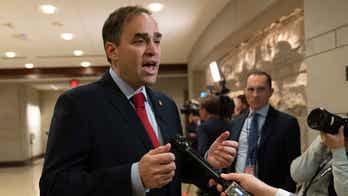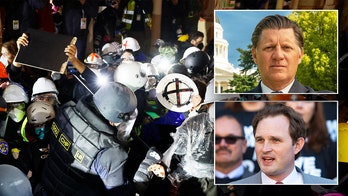The call for a national debate over gun control in the wake of the Connecticut school shooting is being joined by a handful of moderate Democrats typically reluctant to discuss firearms regulation, as lawmakers on both sides of the aisle also urge a much broader discussion about what is causing the violence.
The proposal, first floated over the weekend by Sen. Joe Lieberman, I-Conn., for a "national commission" to examine the entertainment industry and, particularly, video games, has gained traction in recent days.
Republican Iowa Sen. Charles Grassley appeared to endorse that approach in a statement Monday, calling for an all-of-the-above review that also looks at the country's mental health system.
"I think we ought to pursue the ideas that call for a blue ribbon task force or commission with all stakeholders that can look at the much bigger issues associated with tragic events such as this. It certainly can't be a debate just about guns," he said. "There must also be a serious and thoughtful discussion on mental health issues. And, I think you have to look at the culture of the United States which tends to be less civil now than it has been for a long period of time."
At the same time, moderate Democrats have started to gravitate toward the gun control discussion, signaling that the initial legislative debate could focus on that issue.
Virginia Democratic Sen. Mark Warner, in an interview on WTVR in Richmond, said there should be "stricter rules on the books."
"There should not be a Democrat or Republican position on this. It is time for this kind of senseless position to end. And there won't be one perfect law that's going to stop a crazy person from doing evil things. But when we have close to 30,000 killings a year from all types of gun violence, even if we save a few lives we make progress," he said.
Warner's comments followed those of Sen. Joe Manchin, D-W.Va., a moderate Democrat who is an NRA member. Manchin, on MSNBC, said he's open to discussing gun control proposals that his Democratic colleagues are pushing -- even the assault-weapons ban being reintroduced by California Democratic Sen. Dianne Feinstein.
"Everything should be on the table," Manchin said.
As President Obama begins to discuss possible measures with his Cabinet, without offering specifics at this point, the gun control proposals on Capitol Hill are already taking many forms. Sen. Frank Lautenberg, D-N.J., said Monday he plans to reintroduce a ban on high-capacity magazines.
Feinstein said she will introduce a ban on assault weapons entirely, announcing Monday that her proposal would stop the sale and manufacturing of more than 100 types of firearms -- while exempting more than 900 types.
Republican lawmakers, meanwhile, have taken a range of positions as they carefully calibrate their stance. Some have said gun control is simply not the solution, suggesting improvements in the mental health system and other areas are what's needed.
"We recognize those very demented, awkward people commit those crimes. We need to do a better job treating and looking at and finding people who have these problems. That's the issue. We have millions and millions of guns. Guns aren't the problem; sick people are," Rep. Pete Sessions, R-Texas, said.
Meanwhile, Senate Democratic Leader Harry Reid said Monday that in the coming weeks, "we will engage in a meaningful conversation and thoughtful debate about how to change laws and culture that allow violence to grow."
Reid has declined to pursue gun control legislation in the past.
In July, after 12 people were killed in a movie theater in Aurora, Colo., Reid said the Senate's schedule was too packed to have a debate on gun control.
After 32 people were killed in 2007 at Virginia Tech, Reid cautioned against a "rush to judgment" about new gun laws.
The Associated Press contributed to this report.




